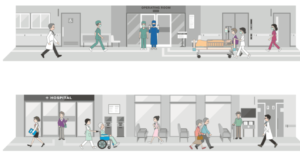How to succeed in your medical job search?
Searching for any jobs can be a stressful process, but searching for a medical job can be even more stressful, and even the most seasoned medical professionals need support. From creating the perfect CV to preparing answers for a challenging medical scenario based interview question, good preparation is important. Below is a list of some critical tips for creating the perfect CV and succeeding in the interview process.
Creating Your Perfect CV
Generally speaking, all medical CVs include the following seven key areas.
- Personal Information: Your name, contact information and abbreviated qualifications
- Career Objectives: Including a short personal statement that states what your goals are in your medical career and how you would like to achieve them
- Education: Where you attended university and what you specialise in
- Relevant Experience: Explain your current and past positions in detail, noting responsibilities and achievements
- Specialised Skills & Procedures: Make sure to list your specialist skills that you are confident and comfortable performing independently, as well as those skills which you wish to improve on and observe. This is also the area to include what recent technology you are competent using
- Continued Medical Education: Be sure to showcase your commitment to professional development and learning, highlighting which medical courses and workshops you have attended or would like to attend
- Research and Publications: If applicable you should share your research and publications along with any awards you have achieved in your career.
- References: You should list at least three references, including full contact details. This should include one behavioural and two clinical references.
The Interview Process
Now that you’ve prepared the ultimate CV and landed the interview it’s time to prepare yourself. Practicing your responses to commonly asked questions can help to make you feel more confident and at ease in the interview process. Don’t be afraid to come to an interview with notes in hand, it’s a great way to show your preparedness and remind you of the key points you want to get across to your potential employer.
So, what questions can you expect to answer during a medical position interview? Let’s start with the following.
- Why did you choose to become a doctor?
You can pretty much expect this question in any medical interview. While it doesn’t exactly give away any of your skills or medical experience, it does show insight into your passion and life experiences. Working in the medical industry takes commitment and your potential employer will want to know what led to you choosing this path. Be ready to answer this question openly and honestly. - What do you see as the key challenges in your field and how would you address them?
This question opens up the chance to display some of your knowledge and talk about your specialist area of medicine whilst explaining how you approach your position in a creative and clinical way, despite challenges you may face. This question is a great way to allow you to demonstrate your initiative with real examples, and have a more in depth conversation about your wider industry skills.
- What are your standout skills as a physician?
We are all different, and every physician is going to have certain skills that make them stand out amongst the crowd. Are you known by your colleagues to have a cool, calm and collected bedside manner during stressful situations? Are you a great communicator that makes patients feel at ease and confides in you easily? Prepare these questions and come to any interview with some defining and true traits that you can speak to.
- How do you handle high-pressure environments?
Understandably all medical professions can be stressful at times and most employers will want to know how you handle high pressure situations, juggling priorities, resource constraints, your duty to care of patients and conflicting personalities. Providing real examples of how you’ve negated these scenarios in the past is a great way to show your potential employer what you can do.
- Role Play Clinical Scenarios
Knowing the key areas of ‘good medical practice’ you are likely to be assessed on in an interview is important going into an interview. In almost every doctor’s interview there will be a role based scenario presented in one way or another, with high pressure clinical scenarios designed to assess your specialist knowledge, communication skills and all-round good medical practice standards. These scenarios will really highlight how you manage patients and deal with conflict situations. The interviewers are likely to assess your physical examination skills, clinical judgement, communication, procedural skills and your professionalism.
With these critical points under practice, Jon & Jon Medical can help you to prepare for your next interview and provide the most impressive CV to get you over the line in your pursuit for your next medical role. Contact our team today to discuss roles available and what you can do to stand out from the crowd.
WHAT DO YOU NEED TO EXCEL IN YOUR MEDICAL JOB SEARCH?
Searching for a job can be a stressful process, even for the most seasoned medical professionals. Whether it’s whipping up an appropriate and attractive CV or preparing for those challenging clinical-scenario based interviews, good preparation is the key. That’s why we’ve crafted a list of critical tips. Let’s take a look.
It all starts with crafting the perfect CV. Generally speaking, all medical CVs include 7 key areas.
YOUR CV
It all starts with crafting the perfect CV. Generally speaking, all medical CVs include 7 key areas.
- Personal information – Include your name, contact information and abbreviated qualifications.
- Career objectives – Include a personal statement that clearly states where you want to go in your medical career and how. Keep it short and to the point.
- Education – Where did you attend Uni? What did you specialise in?
- Relevant experience – Explain your current and past positions in detail. What were your responsibilities?
- Specialist skills and procedures – It is important to list the specialist skills that you are comfortable with performing independently as well as those which you wish to be observed. Make sure to also include what recent medical technology you are confident using.
- Continued medical education – It is vital to showcase your commitment to continued professional development and highlight what medical courses, as well as specialist training workshops you may have attended.
- Research and publications – If relevant, you should share your research and publications as well as any awards you have achieved in your field. What cases have you collaborated on?
- References – You should have at least three. Make sure to include full contact details and include 1 behavioural and 2 clinical references.
THE INTERVIEW PROCESS
That stellar CV has landed you an interview! Now it’s time to prep. Practicing your responses will help you respond with confidence and relative ease.
Don’t be afraid to come with some notes in hand to remind you of the key points you want to get across.
So – what are some of the questions you can expect in an interview for a medical position? Let’s take a look.
- Why did you choose to become a doctor?
This question is a staple in nearly all medical interviews. While it doesn’t pertain directly to your skills, it does give some insight about your passion. Working in the medical field is a serious commitment and your potential employer will want to know what sparked your interest – be ready to answer this honestly and openly.
- What do you see as the key challenges in your field? How do you address them?
This question gives you the opportunity to display your knowledge in your specialist area of medicine while explaining how you approach your position creatively and clinically despite these challenges. You can demonstrate your initiative with concrete examples and have a thoughtful conversation about wider industry solutions.
- What are your standout skills as a physician?
Every doctor has something that makes them stand out from the crowd. Are you known for your calm and composed bedside manner? Do you excel at building relationships with your patients? Make sure you come to the interview with some defining traits in mind.
- How do you handle high-pressure environments?
It’s no secret that the medical world can be stressful at times. Most employers will want to hear how you handle instances of intense pressure, conflicting priorities, resource constraints, duty of care and prickly personalities. Be sure to provide concrete examples of how you have navigated these scenarios in the past.
- Role Play Clinical Scenarios – What are key areas of ‘good medical practice’ you are likely to be assessed for?
While this isn’t exactly a singular question, it is something critical to keep in mind for the interview process. Almost every doctor’s interview will present interviewees with high pressure role play clinical scenarios. They are designed to assess your specialist knowledge, communication skills and all-round ‘good medical practice’ standards when managing a patient, or dealing with a conflict situation.
The panel may focus on assessing your physical examinations skills, clinical judgement, communication, procedural skills and professionalism.

